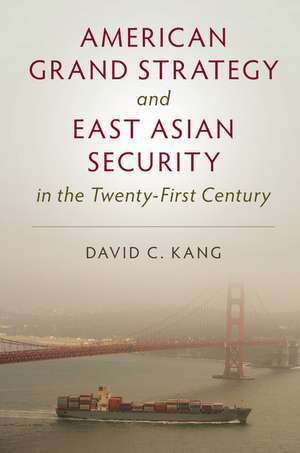American Grand Strategy and East Asian Security in the Twenty-First Century
Autor David C. Kangen Limba Engleză Paperback – 25 oct 2017
| Toate formatele și edițiile | Preț | Express |
|---|---|---|
| Paperback (1) | 201.76 lei 6-8 săpt. | |
| Cambridge University Press – 25 oct 2017 | 201.76 lei 6-8 săpt. | |
| Hardback (1) | 551.58 lei 6-8 săpt. | |
| Cambridge University Press – 25 oct 2017 | 551.58 lei 6-8 săpt. |
Preț: 201.76 lei
Nou
Puncte Express: 303
Preț estimativ în valută:
38.62€ • 40.16$ • 32.31£
38.62€ • 40.16$ • 32.31£
Carte tipărită la comandă
Livrare economică 15-29 martie
Preluare comenzi: 021 569.72.76
Specificații
ISBN-13: 9781316616406
ISBN-10: 1316616401
Pagini: 224
Dimensiuni: 163 x 233 x 15 mm
Greutate: 0.32 kg
Editura: Cambridge University Press
Colecția Cambridge University Press
Locul publicării:New York, United States
ISBN-10: 1316616401
Pagini: 224
Dimensiuni: 163 x 233 x 15 mm
Greutate: 0.32 kg
Editura: Cambridge University Press
Colecția Cambridge University Press
Locul publicării:New York, United States
Cuprins
1. Comprehensive East Asian security; 2. The size of the fight in the dog: costly signals in international bargaining; 3. No arms race: military expenditures in East Asia and Latin America; 4. North Korea: costly signals and a willingness to fight; 5. South Korea: desiring good relations with China; 6. Philippines foreign policy: cheap talk about a free ride; 7. Vietnam: who's chasing whom in Vietnam–US relations; 8. Comprehensive security in Japan, Indonesia, Singapore, and Australia; 9. Powerful patron: America's changing relations with East Asia; 10. A minimalist American grand strategy towards Asia.
Recenzii
'Balance-of-power theory should predict that the countries of Asia are balancing the rise of China. As David C. Kang argues in this terrific contrarian book, there is only one problem: it is is not true. Kang argues for a picture of the Asia-Pacific that is much more hopeful, with strong prospects for continued peace and prosperity. But Kang's analysis comes with one important qualification: that the United States does not over-reach. Refreshing both for its analysis and for its much-needed policy conclusions.' Stephen Haggard, University of California, San Diego
'Provocative and innovative as always, David C. Kang has added another important book to his impressive list of contributions to the study of East Asian security. By matching insights from bargaining theory to trends in regional security policies and military outlays, Kang offers a novel rethinking of the effects of American grand strategy in the region. Particularly at a fraught moment in US diplomacy and security policy, this is a vital intervention in the scholarly and policy debates.' David Leheny, Henry Wendt III, '55 Professor of East Asian Studies, Princeton University, New Jersey
'… this book should be considered required reading for anyone who is interested in East Asian international relations, the rise of China, and U.S foreign policy. It will undoubtedly be read, debated, and discussed for many years to come.' Nicholas D. Anderson, Political Science Quarterly
'Provocative and innovative as always, David C. Kang has added another important book to his impressive list of contributions to the study of East Asian security. By matching insights from bargaining theory to trends in regional security policies and military outlays, Kang offers a novel rethinking of the effects of American grand strategy in the region. Particularly at a fraught moment in US diplomacy and security policy, this is a vital intervention in the scholarly and policy debates.' David Leheny, Henry Wendt III, '55 Professor of East Asian Studies, Princeton University, New Jersey
'… this book should be considered required reading for anyone who is interested in East Asian international relations, the rise of China, and U.S foreign policy. It will undoubtedly be read, debated, and discussed for many years to come.' Nicholas D. Anderson, Political Science Quarterly
Notă biografică
Descriere
David C. Kang tells an often overlooked story about East Asia's 'comprehensive security', arguing that American policy towards Asia should be based on economic and diplomatic initiatives rather than military strength.
